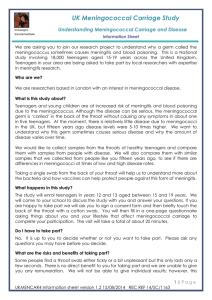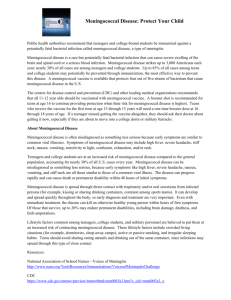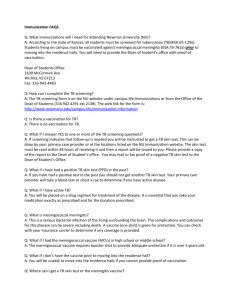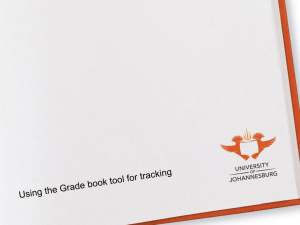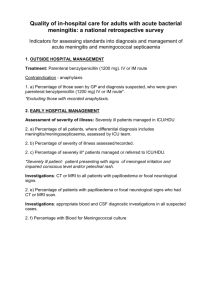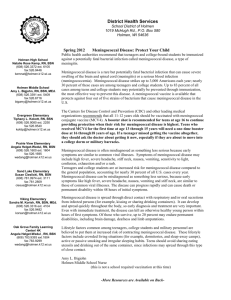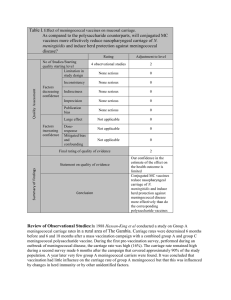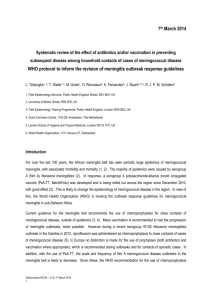UK Meningococcal Carriage Study Understanding Meningococcal
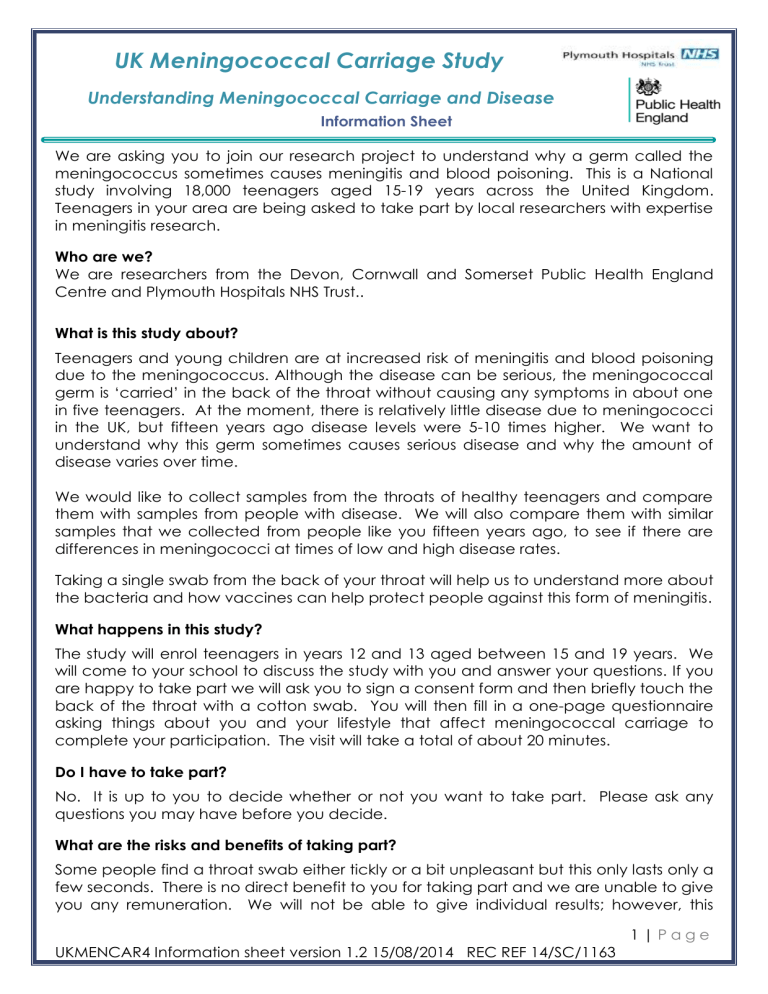
UK Meningococcal Carriage Study
Understanding Meningococcal Carriage and Disease
Information Sheet
We are asking you to join our research project to understand why a germ called the meningococcus sometimes causes meningitis and blood poisoning. This is a National study involving 18,000 teenagers aged 15-19 years across the United Kingdom.
Teenagers in your area are being asked to take part by local researchers with expertise in meningitis research.
Who are we?
We are researchers from the Devon, Cornwall and Somerset Public Health England
Centre and Plymouth Hospitals NHS Trust..
What is this study about?
Teenagers and young children are at increased risk of meningitis and blood poisoning due to the meningococcus. Although the disease can be serious, the meningococcal germ is ‘carried’ in the back of the throat without causing any symptoms in about one in five teenagers. At the moment, there is relatively little disease due to meningococci in the UK, but fifteen years ago disease levels were 5-10 times higher. We want to understand why this germ sometimes causes serious disease and why the amount of disease varies over time.
We would like to collect samples from the throats of healthy teenagers and compare them with samples from people with disease. We will also compare them with similar samples that we collected from people like you fifteen years ago, to see if there are differences in meningococci at times of low and high disease rates.
Taking a single swab from the back of your throat will help us to understand more about the bacteria and how vaccines can help protect people against this form of meningitis.
What happens in this study?
The study will enrol teenagers in years 12 and 13 aged between 15 and 19 years. We will come to your school to discuss the study with you and answer your questions. If you are happy to take part we will ask you to sign a consent form and then briefly touch the back of the throat with a cotton swab. You will then fill in a one-page questionnaire asking things about you and your lifestyle that affect meningococcal carriage to complete your participation. The visit will take a total of about 20 minutes.
Do I have to take part?
No. It is up to you to decide whether or not you want to take part. Please ask any questions you may have before you decide.
What are the risks and benefits of taking part?
Some people find a throat swab either tickly or a bit unpleasant but this only lasts only a few seconds. There is no direct benefit to you for taking part and we are unable to give you any remuneration. We will not be able to give individual results; however, this
UKMENCAR4 Information sheet version 1.2 15/08/2014 REC REF 14/SC/1163
1 | P a g e
research will improve our understanding of meningococcal disease and carriage, and help us understand how vaccines can protect other people in the future.
What will happen to the samples obtained in the study?
We will initially freeze bacteria in your sample and then identify any meningococci we find. This will be done in a research laboratory, and samples will also be sent to National
Reference laboratories in Manchester and Glasgow, and to Oxford University for detailed analysis. We would also like to store any left-over bacteria and human cells that are not needed for this study so that they can be used for future research. This would be done in an anonymised manner, so that researchers using the samples in the future cannot identify the person they came from. You will be able to say on the consent form whether you are happy for us to do this. If you do not want us to keep your left-over samples, you can still take part in the study.
Will any genetic testing be done?
We are not planning to do any human genetic testing in this study. With your permission we would like to freeze your cells in an anonymised form for researchers to use in the future. You would not be identified in any future study.
What will happen to the information?
All information is coded and is kept strictly in confidence. This means we will only tell those who have a need or right to know. Only study personnel will have access to the data that will be stored on a secure server. Any paper notes will be held in your local study centre in a locked filing cabinet. Only authorised study staff can access your data and samples. With your permission, we may check your vaccination history from child health records. Responsible members of the University of Oxford or host organisations may be given access to data for monitoring and/or audit of the study to ensure we are complying with regulations. Anonymised data collected during the course of the study may be passed on to other organisations which may include commercial organisations.
Following completion of the study, all study records (which includes some personal data such as name, date of birth and contact details) will be retained up to 3 years after the youngest participant reaches 18 years of age. Files will be confidentially destroyed if storage is no longer required.
What will happen if I don’t want to carry on?
If you agree to take part and later change your mind, you can withdraw at any time just by letting us know. You don’t have to give a reason. We will continue to use the samples and questionnaire in an anonymised form unless you let us know you would prefer us to destroy them.
What happens at the end of the study?
At the end of the study, we will let the schools who helped out in the research know about the overall findings. Results will be posted on the study website http://www.ukmencar4.org/ and will be published in scientific medical journals and will help lead to a better use of vaccines in the future. You will not be identified in any report or publication.
UKMENCAR4 Information sheet version 1.2 15/08/2014 REC REF 14/SC/1163
2 | P a g e
Who is organising, sponsoring and funding this research?
This study is funded by the Wellcome Trust, and is sponsored by the University of Oxford,
Who has reviewed this research study?
Before any research goes ahead it has to be checked by a Research Ethics
Committee. They make sure that the research is fair. Your project has received a favourable ethical opinion from the South Central-Oxford A Research Ethics
Committee.
Thank you for reading this – please ask any questions if you need to
What if I wish to complain?
If you wish to complain about any aspect of the way in which you have been approached or treated during the course of this study, you should contact Patient
Advisory Liaison Service (PALS) 0845 155 8155 or you may contact the University of
Oxford Clinical Trials and Research Governance (CTRG) office on 01865 572224 or the head of CTRG, email ctrg@admin.ox.ac.uk. The University of Oxford, as Sponsor, has appropriate insurance in place in the unlikely event that you suffer any harm as a direct consequence of your participation in this trial.
So, in summary, what would happen if you decide to take part in the study?
We will come to your school or college and take a throat swab and ask you to complete a brief questionnaire.
If you have any questions or other concerns about the study, please ask one of the study staff.
Alison Stolton Richard Cunningham
Research Nurse Specialist Principal Investigator
Tel: 01752 432850 Tel: 01752 792367 alisonstolton@nhs.net
richard.cunningham@nhs.net
Thank you for taking the time to read this information sheet and considering
whether to take part in this study.
Dr Richard Cunningham Principal Investigator
Consultant Microbiologist
Derriford Hospital
Plymouth
PL6 8DH
UKMENCAR4 Information sheet version 1.2 15/08/2014 REC REF 14/SC/1163
3 | P a g e
